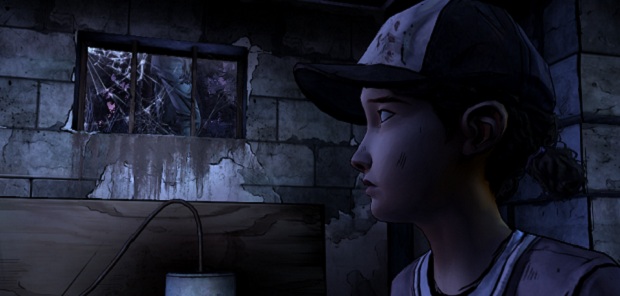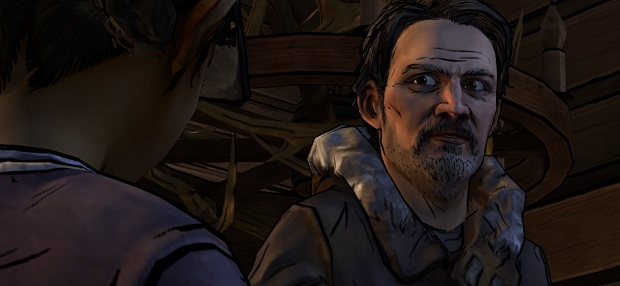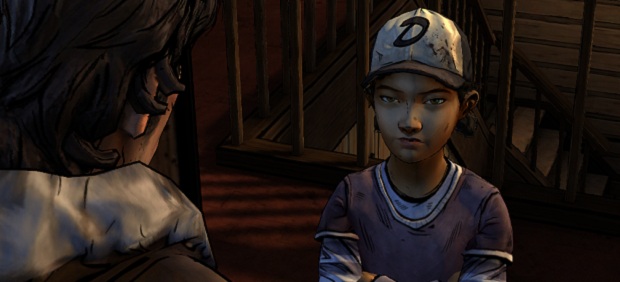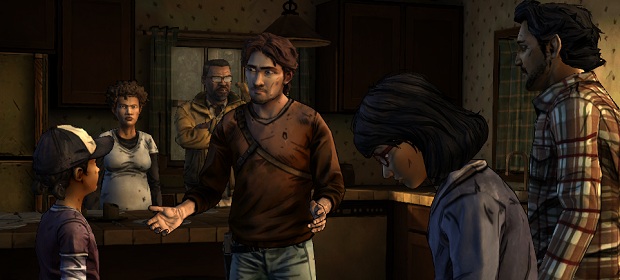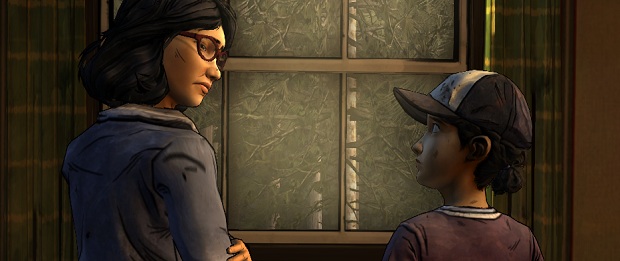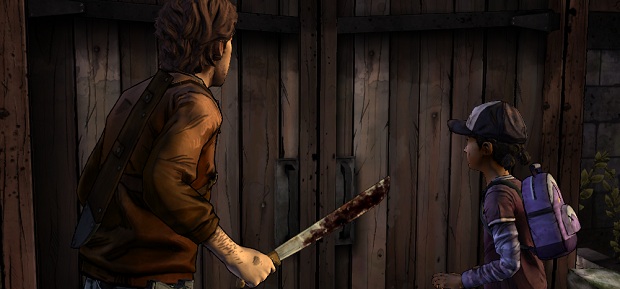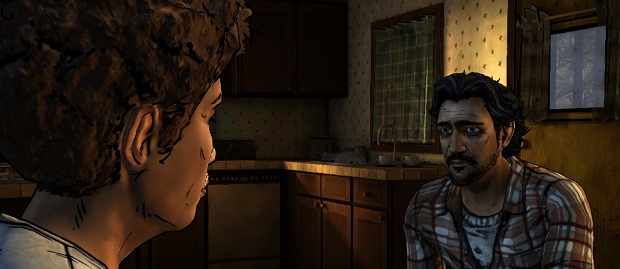Wot I Think: The Walking Dead Season 2 Ep 2
A load of old rot
It’s good to see Clementine again, even if I’m not particularly keen on the new company she's keeping. I’ve just finished playing the first two episodes of The Walking Dead season two and I’m feeling a mixture of grief, frustration and relief. The latter is due to the strength of the second episode in particular. After a wobbly first episode, the transition to Clementine’s time is showing a great deal of care and craft. Here’s wot I think.
AHOY, IT'S A SPOILER WARNING
I haven't mentioned any specifics of episode two, or indeed episode one. I do talk in broad terms about events in episode one but don't assume a knowledge with the characters or what becomes of them. If you haven't played season one though - and ever intend to - you really shouldn't be here. Scram!
The finale of The Walking Dead's first season left me with a hairball of grief in my throat so large that I choked on it for a good five minutes before finally dislodging it in a hail of tears and snot. Lee’s story ended with enough grief to keep Charlie Brown in business for decades but one of the most moving aspects lay in his obvious belief that his story wasn’t ending at all. Clementine would continue that story because she’d carry the skills and attitudes that he’d taught her into the next stages of her life.
Stirring stuff.
Imagine my disappointment when I realised my save file for season one is on another computer in a different cloud, so the game would randomly generate all of Lee’s actions and teachings for me. During the brief recap, I learned that he’d killed just about everybody who I’d chosen to spare and then loudly explained that he wouldn’t have had to slaughter them if he wasn’t dragging a helpless kid around with him. I swear there was a moment when he taught Clementine to smoke and, in his dying breath, spat out the last of their tobacco in a phlegmy stain before softly whispering: “If the roles were reversed, I would have shot your tiny little brain as soon as you started looking a bit peaky.” And then, his lungs hissing empty, “You only ever slowed me down…”
This was not the cautious, kind and merciful father figure I had spent hours gently sculpting. Under his tutelage, I was afraid Clementine would be the leader of a sadistic and maladjusted BMX gang and that I’d be stuck playing an open world Road Rash type of thing. With zombies.
Actually, that could be fun. Somebody go Kickstart BMX Boomtown Brawl.
It didn't matter though. A couple of scenes into the second season, it didn't matter what manner of person Lee had been. I was reacquainting myself with the hairball. Oof. Kaff. Hacchhkk. Episode one doesn’t pull its punches. Here’s a very quick recap of my experiences.
1) Ha ha. I always liked those guys.
2) Fuck.
3) Fuuuuuuck.
4) This dog moment did not play out in the tear-jerking fashion I expected. Fuuuuuuuuuuuck.
5) Intriguing. A brief moment in which the zombies seem like a metaphor for mortality as Clem is losing consciousness and they approach – the light at the end of the tunnel is the pale of a zombie’s exposed skull. Run away from the light, Clem. Run away!
6) Thank my lucky stars. It’s Nathan Drake!
7) These people got issues.
8) ABRUPT ENDING
Nathan wrote more intelligently about that episode right here.
Onto episode two. It’s an improvement and shows a greater confidence in life after Lee, with other characters threatening to step into the void that he left while Clementine draws her own circle in the sand. She is the star of the show now and she doesn’t want another father figure – she wants to be respected, appreciated and treated as a proper person rather than a child-person.
That’s how I play her, at least. She can also defer to her elders, no matter how damaged and damaging they might be, and turn the cutesy-sad eyes on them to earn sympathy and leniency. No matter which dialogue options you choose, Clementine is smart and tough. If she appears weak, it’s because she’s using her apparent vulnerability to disguise the necessary selfish streak of the survivor, like an anxious boardroom executive attempting to hide the fact that he is an ageing mortal with a splash of Just For Men.
The rotten (rotting) world seems larger now and that’s partly thanks to the upgraded engine’s improved vistas. Apart from some flat foliage, the great outdoors look impressive, a green and blue reminder that while humanity’s brief candle may be spluttering, the greater weight of the biomass is continuing without interruption. Just listen to how happy all those buzzing flies sound whenever an audio designer needs to refer to an off-screen corpse-pile or shambler.
Fancier cartoon graphics aren’t the only thing that’s changed. There’s a cleverness to the characterisation and storytelling. Lee started his season of sorrow in handcuffs, trapped in the backseat of a car and when he met Clementine, his world contracted to become the shell around her. She was, along with everything else, a coping mechanism, a small piece of sanity and innocence that he could shield from the horror.
Lee dealt with the trauma of the world’s end by finding something small to care for. He didn’t talk about a future for himself unless it was as an extension of Clementine – his role was to protect her and to pass on what knowledge he could. After that, nothing.
Clementine does have a future though and she’s looking for a place in the world. She seems more capable than many of the adults and that’s partly because she had lived less of a life before the disaster – zombies have been a reality for a significantly greater portion of her existence. By some relative measures, she’s a veteran and they’re all beginners, still clinging to the fat of the land and the comforts of home.
It’s testament to the writers’ skill that the adult characters and players are prone to sentimentalising Clementine’s situation, or specific events, while she toughs it out. This episode digs into the past a little more than the first and I found that any mention of Lee’s name (and that stunningly simple musical theme) caused dust to land directly in my eye, but Clem acts as a counterbalance. She wouldn’t have survived if she was as soppy as I am.
That’s not to say she’s become a rock or an island. She’s still capable of being rattled by the madness of the world and the people in it, and episode two contains events as brutal and disheartening as anything seen so far. There’s a superb early confrontation that plays out as a desperately tense game of cat and mouse, all portrayed through dialogue and only marred slightly by the game’s jerky body language and too-deliberate facial expressions.
Just to be clear, I like the facial expressions. They’re half-way to the dramatic over-expression of a silent film actor, which is entertaining but it’s also precisely why they struggle to convey the subtleties of deception and skulduggery. Every close-up of a raised eyebrow might as well come with a musical sting and a twirled moustache.
Several of the plotlines arrive at their conclusion far too precisely – packaged moments of intrigue and conflict that are too clearly contrived. The short running time (not as short as Wolfamongous s1e2, roughly equivalent to episode one of this series) is reason enough to hurry things along and avoid filler, but I was amused and slightly disappointed when the revelation of one ‘surprise’ allowed me to choose a dialogue option for Clem: ‘I already figured it out’.
I thought the second episode of season one was the weakest of the bunch, a short snippet of American gothic that didn’t advance the plot I’d already started to invest in. The particular horrors it focused on were shown too soon and with too much gusto for my taste. This second season is growing in stature though and it’s particularly heartening to find that Telltale can still make me laugh.
Yes – I laugh at The Walking Dead, although not the bits with the dismemberment, the familicide and the improvised surgery. Moments in the first season elicited the sort of chuckle that releases tension, or communicates familiarity with a friend’s sassy attitude. Lee and Clem were, among many other things, a damn fine double act. In this episode, Clem has a couple of lines that made me smile and her interactions with Nathan Drake Luke are like a stone skipping merrily across a dark lake with a Cthulhu at the bottom.
The ending suggests another tonal shift is coming and I already have my doubts about the direction things seem to be moving in. Cruelty and suffering are an essential part of the story, but it’s the hope and the kindness that really twist the knife. And I want the knife to twist because this is a tragedy above all else, but I don’t want to feel desensitised when it finally slips between my ribs.
After a deliriously rapid first instalment, the second season has found surer footing, concentrating on what Telltale do best. There are no puzzles, just interactions and very occasional and brief QTE sequences. In place of inventory shuffling, there are well-written characters involved in interesting relationships, thrown into situations that bring out the best and worst in them.
A couple of moments touch upon Rick’s ‘WE ARE THE WALKING DEAD’ speech in the comics, though here it's reframed as a different approach to life after the dead rise. I like that Telltale are willing to swing for the boundary with the big gambits, giving their series its own identity and keeping the focus on the diversity of human success and failure. I also like that no matter how grim and grotesque it becomes, there’s always a hint of something good beneath all the betrayal, weakness and compromise.
There’s nothing here to convince anyone who isn’t already on board and the total abandonment of even the most basic puzzles suggests that Telltale are happy with the passengers who have already bought a ticket. They’re concentrating on telling their story and the player’s role is as audience and guest writer/actor. The dialogue choices do matter, at least to me, because even though I lost my Lee in the save-game transfer, I still have this Clementine.
The interactions build that sense of attachment and the choices here at the toughest I can remember in the series so far. That's because Lee had Clem's safety and future as a compass to guide him - Clem only has her own and the bickering and backstabbing of the people around her is dangerous water to navigate. Sometimes I was tempted to make worms' meat of them all. It's notable that the series is establishing a central villain for the first time and yet still manages to avoid making any one character entirely of broad strokes.
Through it all, I laughed, I cried and I savoured the tension. At one point I paused the game and shook my head in frustration, faced with too much bad behaviour in too short a time, but I’m hooked and excited to see what comes next. Episode one ended with an ill-advised bang but episode two continues with a whimper. And that’s as it should be. The Walking Dead excels when it portrays quiet despair and the courage of those that are left behind.

